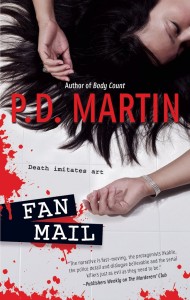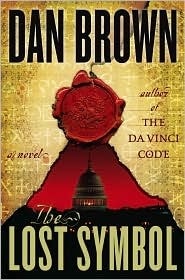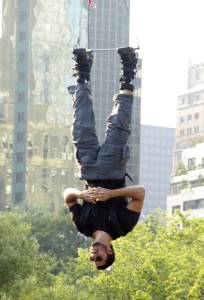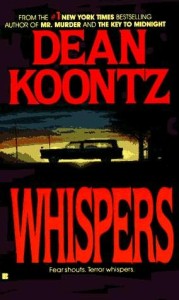Monthly Archives: September 2009
Hanging Upside Down and Other Creative Moves
Well, it is indeed Dan Brown week in the world of publishing, as our own Joe Moore and John Ramsey Miller have attested. And that’s a good thing. The business needs a shot in the arm. We need to see hardcovers flying off the shelves again. We need people sitting around Starbucks talking fiction, getting caught up in a story world.
There’s been a lot of chatter about the phenomenon of The Lost Symbol, as there was for The Da Vinci Code. But today I’d like to focus on another aspect of this event: the author himself.
This latest book was not easy for Mr. Brown. I mean, how do you follow a once-in-a-lifetime hit like TDVC? That book’s particular mix of vast religious conspiracy, symbology and fast paced action went spinning around on the wheel of fortune and hit the jackpot.
Brown cops to the pressure of following up. Regarding the long lag time between TDVC and The Lost Symbol, Dan Brown was quoted in the L.A. Times as follows:
“The thing that happened to me and must happen to any writer who’s had success is that I temporarily became very self-aware. Instead of writing and saying, ‘This is what the character does,’ you say, ‘Wait, millions of people are going to read this.’ … You’re temporarily crippled….[later] The furor died down, and I realized that none of it had any relevance to what I was doing. I’m just a guy who tells a story.”
Writers, attend to this. What happened to Dan Brown on a mega level happens to most writers who publish more than one book. A lot of unpublished writers think things will be just swell once they’re published, and they can produce book after book with nary a worry.
The truth is, writing fiction gets harder because we continue to raise the bar on ourselves. We do, that is, if we truly care about the craft. We know more about what we do with each book, and where we fall short. We hope we have a growing readership, and want to keep pleasing them, surprising them, delighting them with plot twists, great characters and a bit of stylistic flair.
But we can’t stroll down the aisle of “Plots R Us” and choose something fresh, right out of the box. (Although Erle Stanley Gardner was known to use a complex “plot wheel.” I guess he did okay. And, FWIW, Slate came up with its own plot generator for those truly desperate to cash in on the Dan Brown phenomenon). We are on a never ending quest for concepts, characters and plot. No matter how many books we’ve done, we keep aspiring to the next level.
Dan Brown reportedly deals with all this by using gravity shoes. He hangs upside down, letting the blood rush to his head. Bats use the same method. But there are other options.
Whenever you are wondering if you’ve got the stuff to be published (or, if published, to stay that way), let me offer a few helps.
1. Write. This is the most important thing of all. Get “black on white,” as Maupassant used to say. Even if you feel like pond scum as an artist, just start writing. If you can’t possibly face a page of your project, write a free form journal about something in your past. Begin with “I remember . . .” Pretty soon, you’ll feel like getting back to your novel.
2. Re-read. Pull out a favorite novel, one that really moved you. Read parts of it at random, or even the whole thing. Don’t worry about feeling even worse because you think you can’t write like that author. You’re not supposed to. You never can. But guess what? He can’t write like you, either.
3. Incubate. For half an hour think hard about your project, writing notes to yourself, asking questions. Back yourself into tight corners. Then put all that away for a day and do something else. Walk. Swim. Work your day job. Stuff will be bubbling in your “writer’s brain.” The next day, write.
4. Turn off your Internet browser for a whole day. By which I mean, of course, first read The Kill Zone, then turn off the Net and write. Forget emails, Twitter, Facebook, MySpace, or anybody else’s space. A bit of downtime from all the noise is good for focus.
Mental landmines abound for writers. The key is not to let any of them stop you from writing, even if you have to hang upside down to do it.
So how do you get yourself going when the going gets tough?
Does Dan Brown Impress You?
John Ramsey Miller
I am happy for Dan Brown, I’m happy for his publisher, Random House, and I’m happy for his broker. I think he deserves his success, even if I do not fully understand it. None of us knows what readers will hit on, but I do know that chasing a wildly successful book by taking the elements you feel are what struck the chord with the audience is usually a waste of good keystrokes. I don’t think most people can write what they don’t feel and hit home runs with an audience. You know what sells? Entertainment. I can break that down. Readers want to feel good, to know their dreams can be realized, that they can escape reality by getting involved, that good kicks evil’s wide ass, and that hope exists despite a great deal of evidence to the contrary.
Look at the how the lowly Vampire of a few years ago has suddenly been lifted to the heavens. We have vampires drinking synthetic blood, walking about in the daytime, flying like superman, fangs that open like switchblades, feeling emotions, being all sensitive, falling in love, and next we’ll have them procreating like the living, roasting garlic to sprinkle on their popcorn, and ordering scotch and Holy water on the rocks. And now werewolves, ghouls, witches, ghosts, zombies, voodoo priests, magical beasts of every description, are all lining up in the wings waiting their turn to elbow their way into the middle of the stream. Because readers want to feel fear from the safety of their armchairs, and triumph over it without breaking a sweat. They want to believe that there are things they don’t see in their own lives. They (we) want to imagine they can live forever, only if it’s just at night, and they want to believe in monsters, but want even their worst monsters to have a smidgen of goodness buried in there somewhere. And most people believe that animals in jeopardy are more important than people in the same fix. Seriously you can have a monster kill a child that toddles too close, but one that kills curious cats or protective dogs is beyond redemption.
Successful authors gravitate toward subjects, characters, and stories that attract them. I suppose I could write a convincing vampire novel, if I were interested in vampires it might even be interesting, but I’d rather write about gangsters. I’d love to write about the wild West. I’d like to back off to a time when there were no cell phones, few if any telephones, no TV sets and maybe just a radio here and there and newspapers instead of CNN.
The thing about Dan Brown is that his work isn’t a fluke. About anytime a writer is successful, critics pick at his style, impugn his accuracy, and generally rain poo-poo on his ability. Dan Brown is into his story, cares about his characters, and likes slaying giants. Brown is a great writer, and his financial rewards are well deserved because it is a gift to Mr. Brown for what he is offering them in exchange. Maybe Dan Brown won’t win an Edgar, or the ITW for best novel, or any other rewards his contemporaries can bestow. Like so many great commercially successful artists jealousy keeps those prizes away. But authors like Dan Brown, Tom Clancy, JK Rowling, John Grisham, James Patterson, Stephen King, Stephanie Meyer, and Dan Brown, the people are voting, and they are voting yes, yes, yes. When millions of people think you are a great writer, the Nobel, Pulitzer committee, and the critics are irrelevant and should be. Would you rather have a line of awards on your bookshelves, or some producer from the Today show begging you for the fifteenth time to make an appearance, or a Gulfstream V taking you and your family to Europe so you can watch your book being filmed. For most authors I know, it isn’t even close. Of course, all of the above would be heaven.
Point of Who?
By John Gilstrap
www.johngilstrap.com
Those of us who choose to write in the third person limited point of view face a critical challenge after every space break: Who’s going to own the next scene? That choice affects virtually every sentence that follows it. It affects the action, the voice, the word choice . . . everything. Point of view selections even inform the direction that the plot is going to take.
Let’s say that we’re going to write a fictional account of the Battle of Gettysburg during the Civil War. For the uninitiated, that engagement, fought in July of 1863, is widely considered the turning point in the war—the defeat from which the Confederate Army never fully recovered. More than 160,000 troops descended on a town of 2,400 residents, and at the end of three days of fighting, over 60,000 lay dead or dying, with many thousands more left wounded on the battlefield.
In our fictional account of the story, who will our POV characters be? If we choose to tell a story set among the commanders (George Meade for the Union, Robert E. Lee for the Confederates), it seems to me that it would be too limiting to assume the role of either commander, if only because their lives and decisions are so well documented. Instead, I would probably create a fictional aide de camp whose thoughts and observations I would record. I would imagine that this choice would have us writing battle scenes from a big-picture, strategic world view.
Maybe we’d want to tell the story of the battle from the POV of a rank-and-file soldier, in which case our story would be less about momentous command decisions than it would be about the everyday soldier’s life of unending boredom punctuated by blind terror. Our character’s view of the battle would not concern itself with troop movements on the grand scale, but rather from the very limited perspective of a man under fire choking on the stench of smoke and blood. If he could see anything, it would likely be the shoulders of the soldier in front of him.
Another option might be to tell the story of a Gettysburg resident, a civilian facing the horrors of war and its aftermath. Shall we choose a young woman who fears for the safety of her children? A middle aged man who feels guilt for not being part of the battle? Maybe the town doctor who is facing an unending stream of catastrophic traumatic injuries.
Whichever choice we make, the story will report on the same event, but the perspectives taken on that event will be wildly disparate depending upon our choice of POV.
Take the historical nature of the event out of play and the same challenges continue to exist. If we’re writing a divorce drama from the POVs of both husband and wife, we need to choose which perspective delivers the most drama for the scene where the lawyer reveals the investigator’s tapes of the wife cheating on hubby. If we’re writing a story about a kidnapping, we need to decide whether the actual snatching is best revealed to the reader through the point of view of the victim or the mother who sees him being spirited away.
These are really important decisions. How do you make them? Do you have to go back and rewrite your choices like I have had to do more times than I like to think about? For you first-person writers, do you face any kind of the same choices in your writing, or does the narrow window insulate you from them?
Reason to kill?

By P.D. Martin
Today TKZ is thrilled to have a tremendous writer from the land down under join us, author PD Martin. In her latest release, Fan Mail, Aussie FBI profiler Sophie Anderson is working a case where fiction has become fatal. A popular crime writer is murdered and posed just like the crime scene in the dead author’s last book.
Could crime fiction incite someone to kill? This is a question I’m often asked, and it’s one of the themes I explore in my third book, Fan Mail.
Having done lots of research on murder and criminal psychology, my belief is that if someone is going to take another human being’s life, reading fictional accounts of murder is not going to push them over the edge. Having said that, we do live in a world where we’re increasingly exposed to violence and graphic crime-scene depictions.
Take the many successful (and entertaining) shows on TV: CSI, Bones, Law & Order: SVU…and then, of course, there’s Dexter. But have we really been desensitized?
A few years ago, after lots of meticulous research into horrific and violent crimes, I honestly believed I was desensitized, almost in a similar way to a cop. I’d imagined some horrible situations and written about them in detail. I was tough!
Or so I thought, until I met Victoria Police’s profiler, who gave me a list of law-enforcement text books to help with my research. I ordered them online and was so excited when they arrived; and the timing couldn’t have been better because I was packing for a week-long writing retreat. I threw the books in my luggage and headed down to the beach.
The first thing I did when I arrived was to unpack the books and start flipping through one…and then I saw it. The first page the book opened to was a photo from a crime-scene in which a woman had been raped then murdered. The killer had tied her down and posed her in a disturbingly revealing way. Next photo: a dead woman with both of her breasts cut off. Next p hoto: a decomposing body. Next photo…I think you get the picture. In that instant I realised my so-called desensitization wasn’t real. They say a picture tells a thousand words and in the case of crime-scene photographs, it’s certainly true. The new set of books disturbed me, but they also made me understand my character, Aussie FBI profiler Sophie Anderson, so much more intensely – to be faced with these photos every day and go on….it’s definitely one of the hardest jobs in the world.
hoto: a decomposing body. Next photo…I think you get the picture. In that instant I realised my so-called desensitization wasn’t real. They say a picture tells a thousand words and in the case of crime-scene photographs, it’s certainly true. The new set of books disturbed me, but they also made me understand my character, Aussie FBI profiler Sophie Anderson, so much more intensely – to be faced with these photos every day and go on….it’s definitely one of the hardest jobs in the world.
I’m thankful that I write fiction because I can make stuff up and no matter how graphic and horrific, I know it’s not real. And this is also a large part of why I don’t think crime fiction can, or would, incite someone to kill. It is fiction, and no matter how descriptive or well written we know it’s not real. Law-enforcement text books on the other hand…they could be very scary in the wrong hands.
So I’m curious: what do you think? Could reading crime fiction serve as the catalyst for actual crimes?
PD Martin – Phillipa Deanne Martin – is an Australian author with a background in psychology. She has written four novels featuring Aussie FBI profiler Sophie Anderson, of which the first three are currently available in North America – Body Count, The Murderers’ Club and Fan Mail. See www.pdmartin.com.au for more information.
The Dan Brown flagship
By Joe Moore
 The waiting is over. THE LOST SYMBOL by Dan Brown hit the store shelves yesterday. Love him or hate him, this is a big deal in the world of publishing.
The waiting is over. THE LOST SYMBOL by Dan Brown hit the store shelves yesterday. Love him or hate him, this is a big deal in the world of publishing.
First there was the long 6-year delay. Then the street talk that Brown would never write another book. Then the possible title: THE SOLOMON KEY. Then the revealing of the anticipated cover. And now the day has come. It’s here—all 5 million, first-print-run copies. Now the big questions are: Will it sell as many copies as THE DA VINCI CODE(80 million)? How long will it sit in the number one slot of every bestselling list on the planet? And is it as good as TDC and ANGELS AND DEMONS? Here are two advance reviews:
The Los Angeles Times calls it “. . . like any roller coaster – thrilling, entertaining and then it’s over.”
The New York Times calls it “sexy” and “impossible to put down.”
So what does this publication mean for us thriller authors? The way I see it, if all of us are ships in a naval battle group, THE LOST SYMBOL is the admiral’s flagship aircraft carrier pulling us in its wake, setting the course, and identifying the potential destination. When TDC came along, it created a whole new cottage industry of thrillers that contained secret societies, lost treasures, relics, scientific and religious conflicts, and other like-minded themes. I know that for me, it helped build interest in four of my novels. But in the bigger picture, it created a hunger. Just like Indiana Jones movies renewed an interest in the dark side of the 1930s-1950s, the Nazi, religious antiquity, and archaeology, Dan Brown and his books have continued to feed that hunger. A hunger that will potentially spill over to other books and writers. Because, once readers finish THE LOST SYMBOL, hopefully they’ll be hungry for more. The void must be filled.
Here’s an example from Library Journal where one of my books is mentioned.
I’m excited not only for Dan Brown, but for all thriller authors. This guy is shooting full-court 3-pointers, but the thriller team is ultimately the winner.
Do you plan on reading THE LOST SYMBOL? Do you consider it a thriller genre-boosting event or just another high profile novel by a famous writer?
Contagion
This week’s post will be brief because I woke up this morning with flu-like symptoms that have been making me feel achy-breaky most of the day. Authorities tell us that any flu this season can be assumed to be H1N1, formerly known as swine. The good news is that most cases are going to be relatively mild. But don’t take that for granted–the husband of a close friend of mine (who suffers from asthma), spent three weeks in St. James Hospital here, and it was touch and go for a while after it it settled into his lungs as pneumonia. If you have any type of lung or pulmonary issues, and you come down with flu, don’t wait before getting treatment. Do it right away.
The flu has fallen out of the media spotlight, but it has spread to just about everywhere by now. Here’s the CDC flu map, in case you haven’t been following the story lately.
Muscle aches aside, I do want to pull the topic back to writing, so I’ll list some of my favorite stories involving viruses: The Andromeda Strain, The Hot Zone (nonfiction and not well written, but it did scare the hell out of me). And now I’m putting Robin Cook’s Contagion on my TBR list. I saw Mr. Cook speak at Thrillerfest, and it’s amazing how brilliant and prolific as an author he is.
What are your favorite medical thrillers? Did any scare the bejeezus out of you?
Are You Ready for Your Close-Up?
by Clare Langley-Hawthorne

 experience (on RVTV noir) which was terrific and not as nerve wracking as I feared…until…they asked me to take a look at the raw footage. I soon discovered that I cannot bear to watch or listen to myself on camera. Pathetic really – but from the snippets I did see (between my fingers) I gained some useful insights in case one day I get that call from Oprah…
experience (on RVTV noir) which was terrific and not as nerve wracking as I feared…until…they asked me to take a look at the raw footage. I soon discovered that I cannot bear to watch or listen to myself on camera. Pathetic really – but from the snippets I did see (between my fingers) I gained some useful insights in case one day I get that call from Oprah…1. Do wear the bright red jacket. I was thankful that I had chosen something vibrant as (being the pale Celt that I am) it looked terrific on camera. I tastefully also avoided any kind of pattern that might either flare on screen or make me look fat (I am so vain!)
2. Ignore the cameras – insofar as you want to look as natural as possible…but also make sure you engage the imaginary audience out there so there is some eye contact. As I couldn’t bear to watch myself I’m not sure how successful I was on this front…but the kind camera crew said it looked good.
3. Record yourself to hear how you actually sound reading from your work. This is not something I did but when I heard myself on the footage I realized that this would have been a great tool to use – perhaps then I wouldn’t have cringed when I heard my accent:)
4. Relax. I did this and the interview went by so fast I hardly knew I’d had one. I think this helped make the show feel like a natural extension of a one-on-one conversation rather than a stilted ‘in front of the camera’ interview.
I’m now excited about the possibility of using video/TV for marketing…though I guess I have to get over my embarrassment of watching myself first. I also have to give a huge thank you to everyone who came to my events in Ashland and Klamath Falls and to Maureen who organized it all:)
How to Write Action Scenes
I recommended he read how Dean Koontz does it, especially in what is considered his breakout bestseller, Whispers (1980). There Koontz has an action scene (an attempted rape) that lasts 17 pages (that’s right, 17 pages!) all taking place within the close confines of a house.
Another panelist protested (in a good natured and professional manner). He said action needs to be “realistic.” For instance, when a gunshot is fired nobody has time to think. It all happens too fast. If they’re shot, the pain comes, and they will not be reflecting on anything. They’ll just be in pain.
This was grist for a great discussion. I licked my chops but, unfortunately, we were at the end of the panel and time was called. I never got a chance to respond. Now I do.
I would have said, first, that a gunshot does not cover the wide spectrum of action. In the Koontz scene from Whispers we have someone stalking the Lead. No guns. So that example is of limited value.
But further, and even more important: fiction is not reality! Fiction is the stylized rendition of reality for an emotional effect.
That’s so important I’ll say it again: Fiction is the stylized rendition of reality for an emotional effect.
Reality is boring. Reality is not drama. Reality is to be avoided at all costs (“We must stay drunk on writing,” Ray Bradbury once said, “so reality does not destroy us.”)
A thriller writer wants the reader to believe he or she is vicariously experiencing the story. We use techniques to engage the reader’s emotions all along the way. If there is no emotional hook, there is no thrill, no matter how “real” the writing seems.
Let’s have a look at a couple of clips from Whispers. Hilary Thomas, a successful screenwriter, comes home to discover that Bruno Frye, someone she’d met once, is waiting for her, and not for a game of cribbage.
She cleared her throat nervously. “What are you doing here?”
“Came to see you.”
“Why?”
“Just had to see you again.”
“About what?”
He was still grinning. He had a tense, predatory look. His was the smile of the wolf just before it closed its hungry jaws on the cornered rabbit.
Koontz breaks into the dialogue exchange for some description. The effect is like slow motion, which is another key to a good action scene. In essence, you slow down “real time” to create the feeling and tone you desire.
He took a step toward her.
She knew then, beyond doubt, what he wanted. But it was crazy, unthinkable. Why would a wealthy man of his high social position travel hundreds of miles to risk his fortune, reputation, and freedom for one brief violent moment of forced sex?
Now Koontz inserts a thought. In real time, when a rapist takes a step toward a victim, there would probably be no reflection, no pondering. But fiction enhances moments like this. Koontz is stretching the tension. He wants the reader taut while furiously flipping pages.
But 17 of them? Is Koontz insane? Or is he one of the best selling writers in history for a reason?
In fact, Koontz is a consummate pro who knows exactly what he’s doing. He even names it a couple of pages in:
That, my friends, is stylization for emotional effect. If you’d like to grumble about that –– complain that it isn’t “like reality” –– you may send your objections directly to Dean Koontz, who gives his address in the back of his books.
Let me know what he says.
Meanwhile, if you’re looking to sell your fiction, learn to use the tools. Especially in actions scenes.
So what about you? Any writers you think do action particularly well? What makes an action scene work for you?
Let’s Leave JD Sleeping…
John Ramsey Miller
This week I was reading about a famous photographer with serious financial problems and I was thinking about how her dilemma is really nobody’s business but hers and the people she owes the money to. She collateralized a loan with the copyrights of every photograph she’s ever taken or will take. Other than the fact that it’s a cautionary tale of reversal, it’s just another story about someone who got in over their head. Why do we thrive on other people’s problems and especially their failures? There’s a German word for it that I can never remember how to spell and have to look up. It’s Schadenfreude. I don’t know why we don’t have a word in English for it. We watch fascinated like we’re getting paid for every Icarus that flies too close the media’s headlights. This incident with the photographer got me thinking about copyrights. It’s something authors should think about, become familiar with. I checked on the Net.
How long does a copyright last?
The term of copyright for a particular work depends on several factors, including whether it has been published, and, if so, the date of first publication. As a general rule, for works created after January 1, 1978, copyright protection lasts for the life of the author plus an additional 70 years. For an anonymous work, a pseudonymous work, or a work made for hire, the copyright endures for a term of 95 years from the year of its first publication or a term of 120 years from the year of its creation, whichever expires first. For works first published prior to 1978, the term will vary depending on several factors. Of course it’s complicated, and I don’t really know much about it. I guess we might all do to know where we stand legally speaking.
How familiar are we with the laws that protect us. And do you understand the Google Settlement? How pissed are we to get if our copyright is violated?
I started a new work this week and I’m excited about it because I’ve been doing a mental dance with the protagonist for a couple of months getting to know him, his cadence, his backstory. It’s not a thriller, it’s a story and I want to tell a story that isn’t a chase against the ticking clock. I don’t want my characters wearing their shoes out twice from the front cover to the back. I just want to once be able to peel an onion layer by layer and build suspense differently. I wonder how I would feel if somebody took this character after I am dead or have wandered off into the woods or am living with my chickens and dogs and put him in a book they wrote. I think I’d be weirded out.
A question comes to mind from a recent lawsuit. If I want to write a book that includes characters from Salinger’s book, CATCHER IN THE RYE, can I do it? Say you want to write a book that takes Holden Caufield thirty or forty years beyond where Salinger left him, can you do it? Why pick up something Salinger dropped? Can you do it if you get Salinger’s permission? Why would anybody write a book, spending a couple of years laboring at it using someone else’s character or characters?




